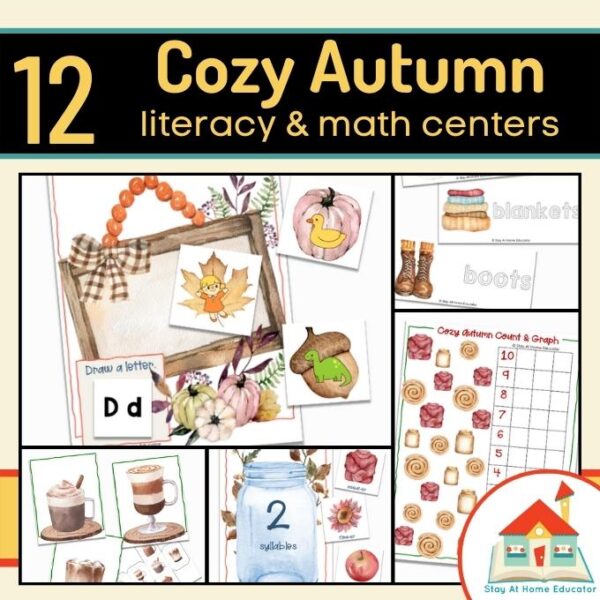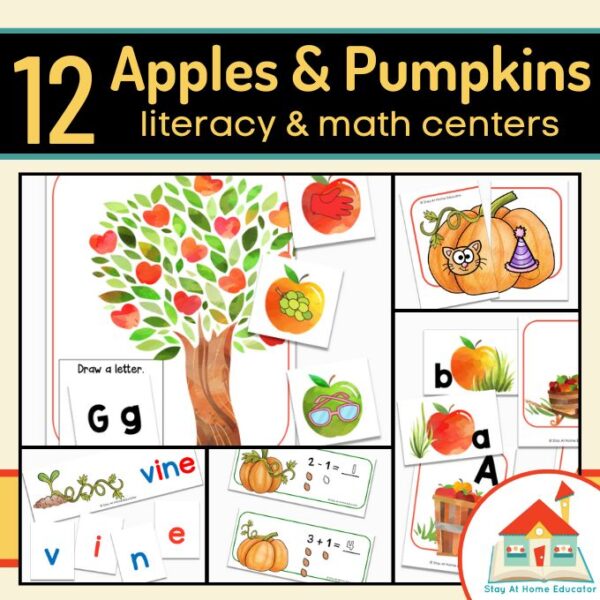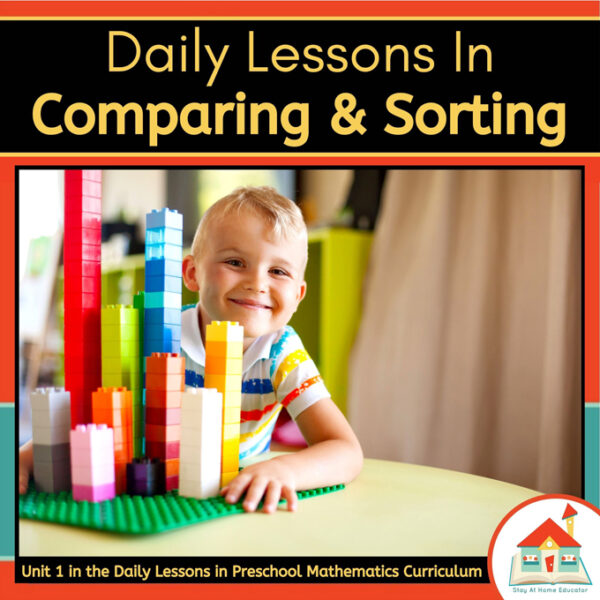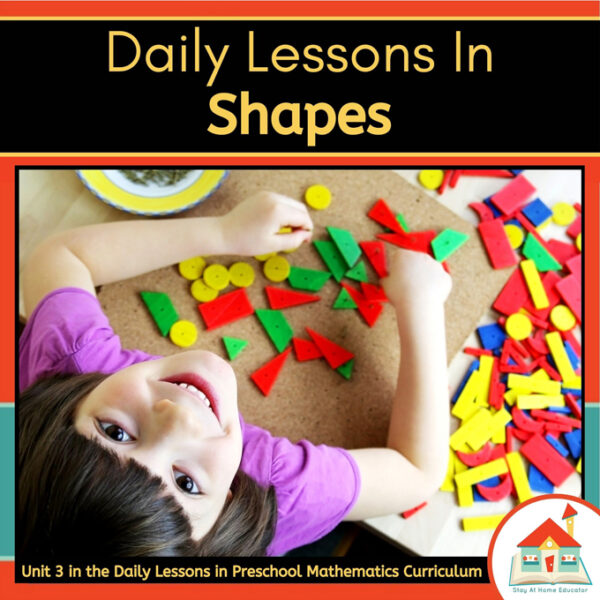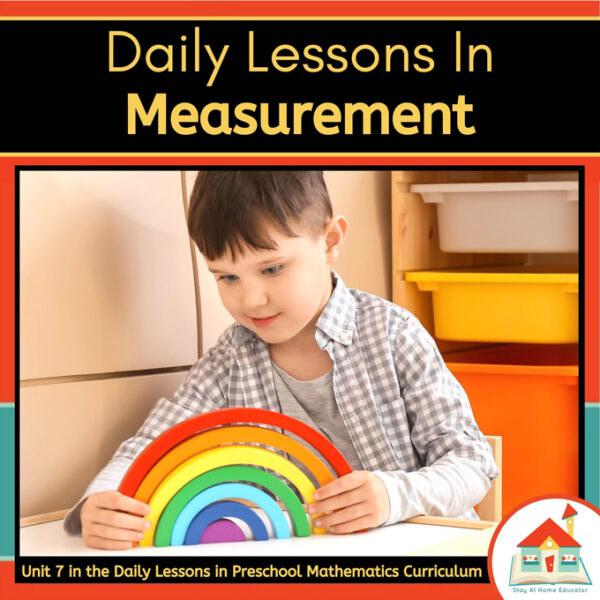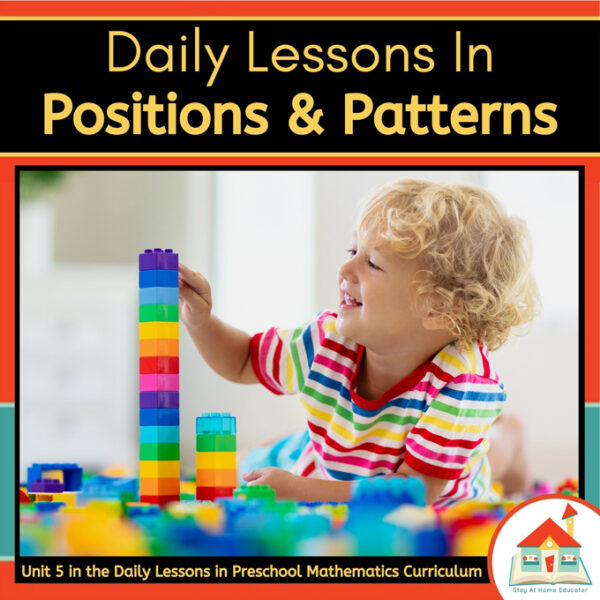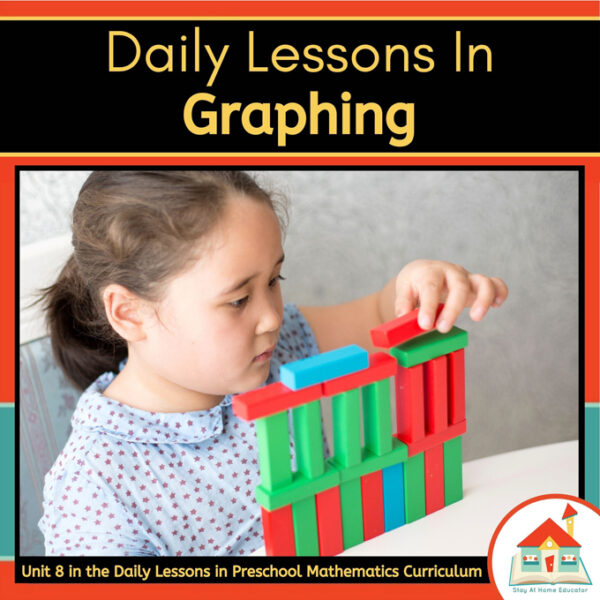Have you ever tried a sunflower theme during your fall preschool activities? Every fall, just after we get through our back to school activities, we explore sunflowers. My preschoolers always love our sunflower science unit, and this year we added sunflowers to our preschool science center.
Fall Science Activities Using Sunflowers
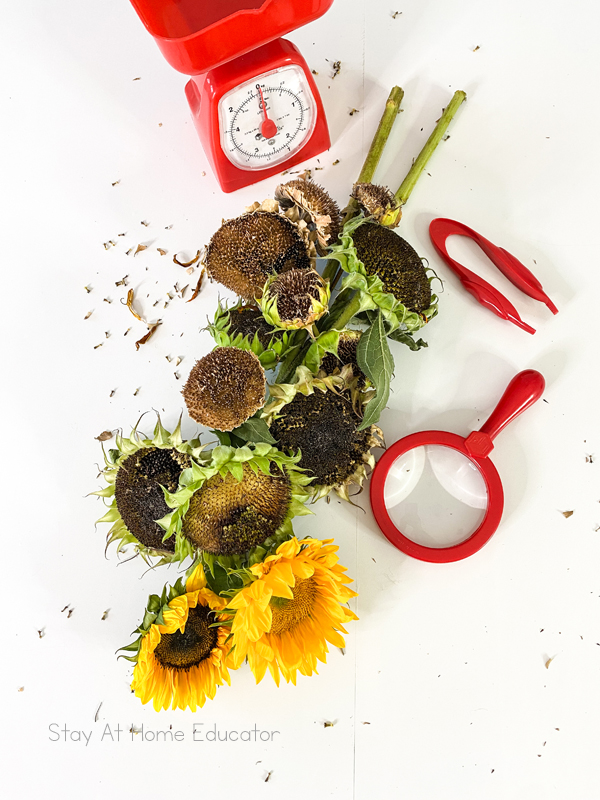
When we think fun fall activities for preschoolers, we often think of activities with fall leaves flutter from the trees and sneaky squirrels hiding acorns for the winter. Our fine motor activities might feature pumpkin seeds and play dough, but what about sunflowers?
Where I live, I know the fall season has officially arrived when the green grasses alongside our freeways become dotted with yellow Black-Eyed Susans.
This year, we decided to bring sunflowers into the classroom for some fall science experiments. For this activity, we created a science center for preschool that was loaded with sensory play, as well as measurement skills and fine motor work for my preschoolers.
FAQ About Teaching Science to Preschoolers
The items you include in a preschool science center should be determined by the learning goals for the center. Items should allow children to work and explore in a hands-on manner. Always add realia (real life materials) whenever possible. Include real photographs, too. Science tools for the preschool classroom can include:
~ magnifying glasses
~ tweezers
~ mirrors
~ platform scale or balance scales
~ measuring tubs
~ note pads and colors for observations
Preschoolers are naturally inquisitive and full of questions, so it makes sense that teachers should take advantage of that curiosity in the classroom. A science center in preschool can channel their enthusiasm for scientific discovery. It can seed a life-long interest in STEM fields, therefor increasing the likelihood of entering the field in adulthood.
Preschool science centers are also important because they are developmentally appropriate. Science centers tend to be process driven and hands-on, which increases critical thinking skills and creativity.
The easiest way to integrate science in literacy activities is to teach science based preschool themes. These themes can be anything from a farm theme or winter theme to space or dinosaurs.
Themes should include a wide variety of books, both informational and fiction stories. Vocabulary words with pictures can be hung in the classroom and used when teaching literacy concepts, too. Science concepts can be taught through emergent readers, too.
Related Reading
Sunflower Science Center for Preschoolers
Fall leaf activities are the bee’s knees in fun activities and science experiments for kids, but sunflowers are also iconic of fall and offer a lot of learning in your fall lesson plans for preschool.
Materials
- magnifying glasses
- tweezers
- platform scale or balance scales
- assortment of real sunflowers
How to Set Up a Sunflower Science Center for Preschoolers
At your science center, or on a table that can be sued as a workspace, set out all the above materials in a pleasing way. A preschool science center should be inviting and interesting.
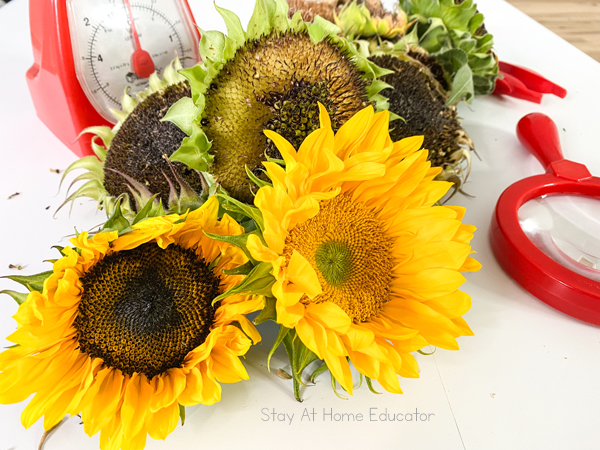
Children’s Books About Sunflowers
How to Teach Science While Using a Preschool Science Center
At first glance, a science activity for preschoolers can look a lot like “just play”.
When I present a new science center to my preschoolers, here’s how I go about it:
- Introduce new theme, if applicable, by naming items.
- Name the science tools and review how to use them properly.
- Relate the new theme back to other classroom activities.
- Make suggestions on how to use the science center.
A sunflower science center wasn’t going to last multiple days, since I offered jumbo tweezers for some added fine motor work and exploration. This science center is loaded with learning, and it also acts like a fall invitation to play, too.
Pulling Seeds Using Tweezers
As soon as my preschoolers lifted the first sunflower, they saw the hundreds of seeds that were tightly packed into the center. And they set to work prying them out. Some preschoolers used the tweezers, others tried with only their fingers. They loved that the seeds scattered on the table. And they also loved
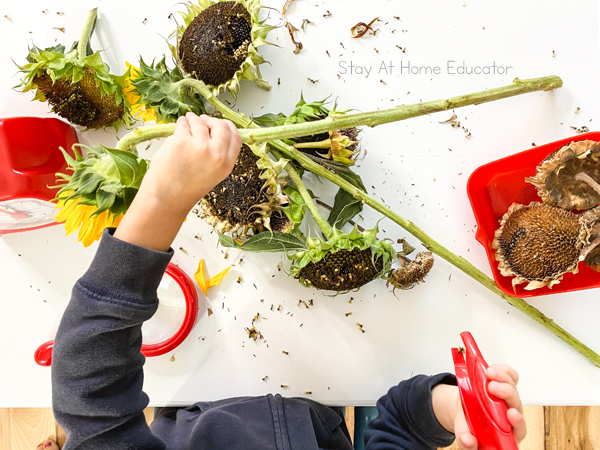
Use a Magnifying Glass to Make Observations
This is one of my favorite ways to teach science activities for kids! Not only do preschoolers love using magnifying glasses, but this is an excellent way to encourage oral language development. Here are some questions you can ask your preschooler.
- What do you see?
- How does the magnifying glass change what you see?
- What colors are on the flower?
- How many seeds do you think there are? Should we tweeze more out?
- What do you think might happen to the seeds if they fall on the ground outside?
- Do you think animals might eat sunflower seeds? What kind of animals?
- Why are the leaves green on this sunflower and not on the other?
- Look at the stem of the sunflower. What do you see on it?
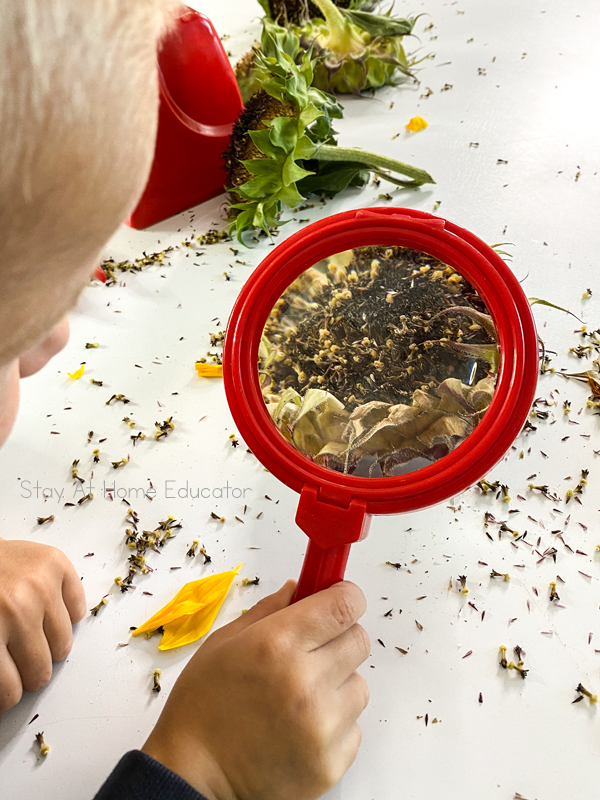
Picking Off Petals and Seeds
Science activities that double as sensory activities tend to be a little messy, but this it nothing the average vacuum or broom can’t handle. My preschoolers even loved using their hands to pile up the sunflower seeds. They also picked off any petals from the flowers, and commented on their velvety texture.

Use the Platform Scale to Measure Weight
After picking off all the petals and seeds, the preschoolers naturally started adding the nature materials to the platform scale, measuring how heavy different items were. Using a scale, even in informal activities like this one, can help preschoolers make connections in math, such as:
- The number on the scale might change based on what is in the scale.
- The larger the number the more the items weigh.
- Some items can be large but weight very little, while other items can be large and weigh a lot.
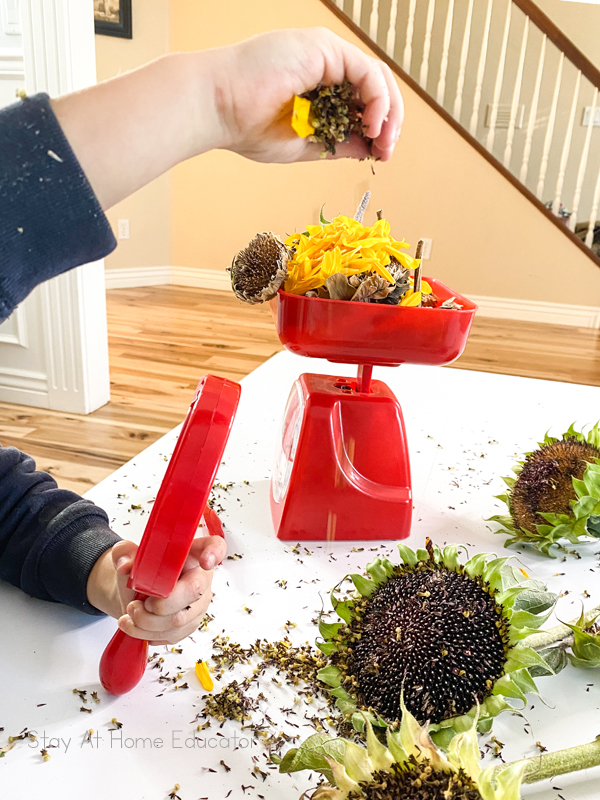
More Fall Themed Preschool Science Activities
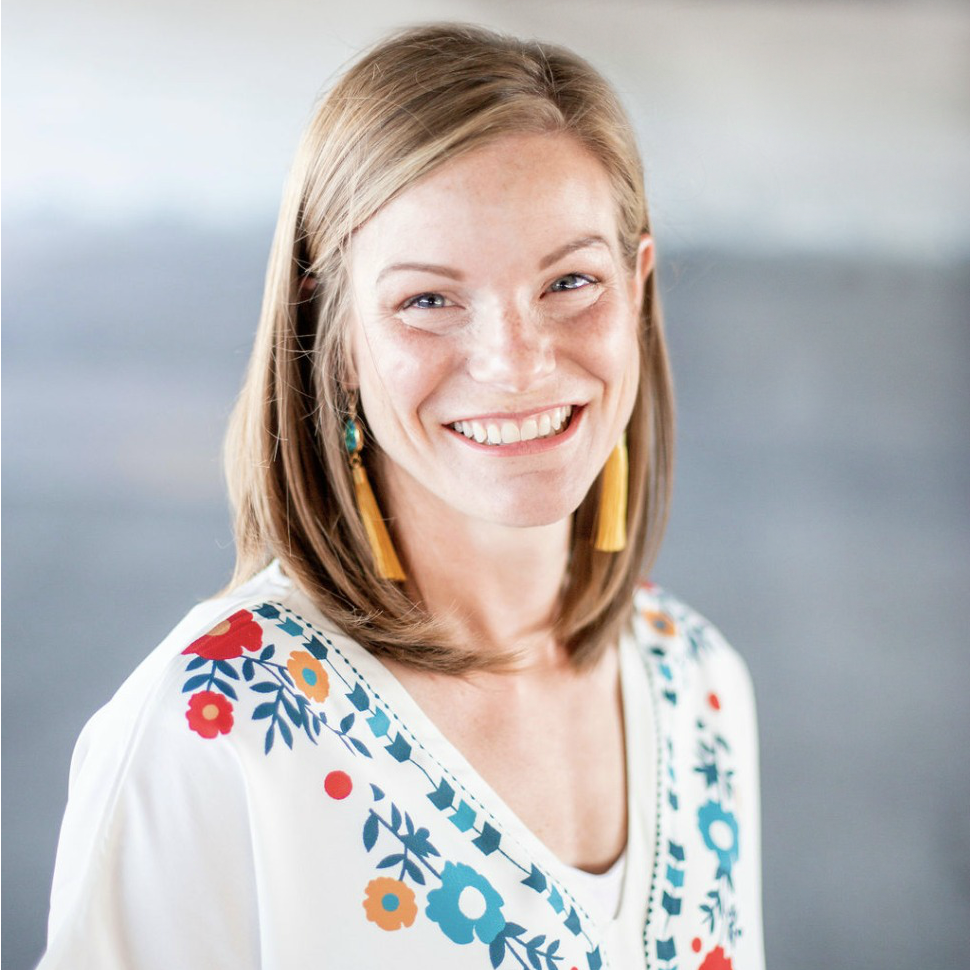
I’m Sarah, an educator turned stay-at-home-mama of five! I’m the owner and creator of Stay At Home Educator, a website about intentional teaching and purposeful learning in the early childhood years. I’ve taught a range of levels, from preschool to college and a little bit of everything in between. Right now my focus is teaching my children and running a preschool from my home. Credentials include: Bachelors in Art, Masters in Curriculum and Instruction.
